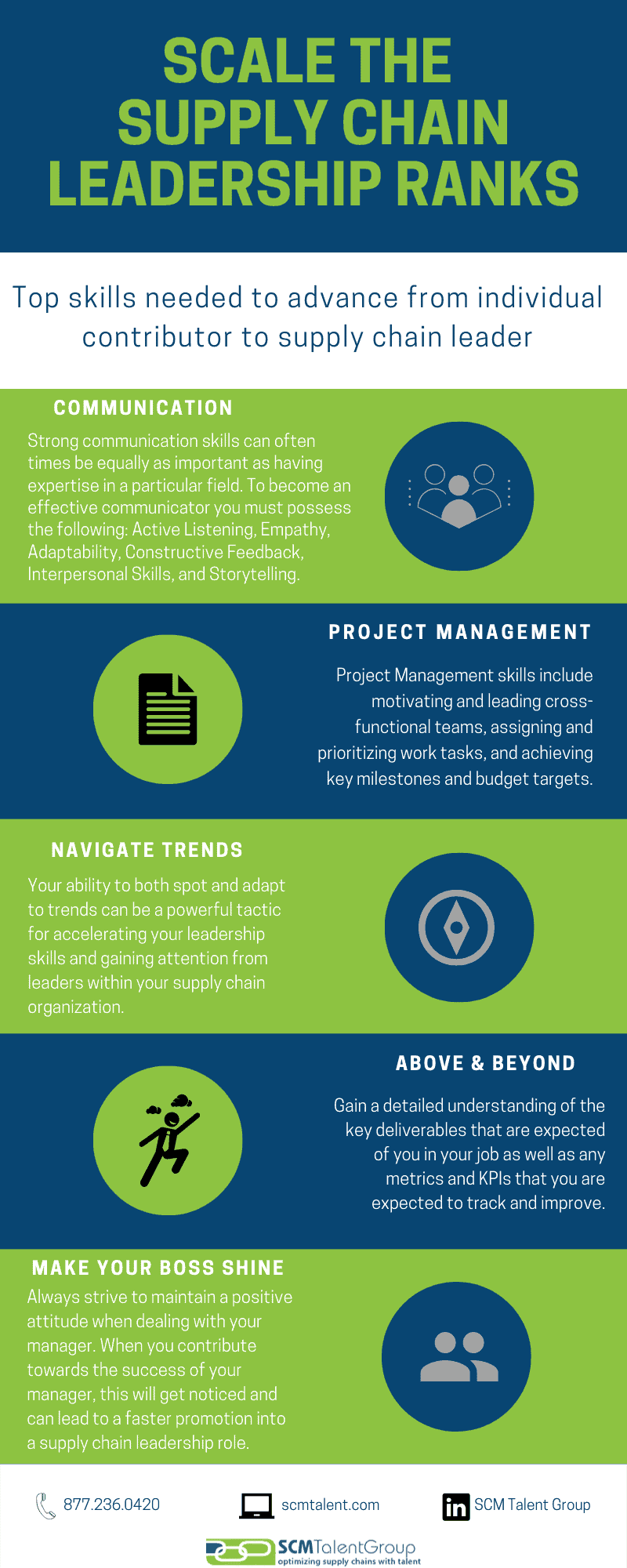
Top Skills Needed to Advance from Individual Contributor to Supply Chain Leader
One of the most common questions I receive from budding supply chain professionals is “How do I get promoted from an individual contributor role to a supply chain leader?”
While there is no magic formula, there are several key skills and experiences that one should gain in efforts to transition into a supply chain leadership role.
Communication
For many supply chain leadership roles, strong communication skills can oftentimes be equally as important as having expertise in a particular field. Here are few skills to develop or sharpen as it relates to becoming an effective communicator:
- Active Listening – listen with the intent to understand, as opposed to reply
- Empathy – putting yourself into others shoes to understand and act genuinely
- Adaptability – tailor your communication style to align with the audience or situation
- Clarity – succinct, to-the-point communication style, avoiding rambling and tangents
- Confidence – firmly believing in yourself and exuding confidence
- Constructive Feedback – being able to both give and receive helpful feedback
- Emotional Intelligence – identifying and managing others’ emotions and your own
- Interpersonal Skills – building rapport and developing relationships with others
- Non-verbal Communication – understanding and responding to non-verbal cues
- Open-mindedness – understanding differing perspectives and the ability to change your mind
- Simplifying – converting technical or complex topics into layman’s terms
- Storytelling – engaging and captivating your audience through telling genuine stories
Project Management Chops
Supply chain professionals must be highly organized as it relates to managing their time effectively and making the right level of progress towards assigned goals and objectives.
A great way to strengthen your people leadership abilities is to improve your project management skills, especially as it relates to motivating and leading cross-functional teams, assigning and prioritizing work tasks, and achieving key milestones and budget targets.
If you lack project management experience, then you need to position yourself to gain this. A great place to start is to inform your superiors that you would like to support future projects for your department or the overall supply chain organization. In addition, you should check out the training and certification programs offered by the Project Management Institute (PMI).
Understanding and Adapting to Trends Within Supply Chain and Your Industry
If there is anything that is constant within the field of supply chain, it’s rapid change. Many supply chain professionals make the mistake of focusing too much time on their day-to-day jobs, and not enough time reading up on supply chain trends or researching what leading companies in their industry are doing from a supply chain perspective.
Your ability to both spot and adapt to trends can be a powerful tactic for accelerating your leadership skills and gaining attention from leaders within your supply chain organization, which in turn can help propel your career from an individual contributor into a supply chain leadership role.
Here a few ways to keep a strong pulse on trends occurring within supply chain and your industry:
- Networking – join supply chain associations and industry-related associations where you can digest their content and engage in networking activities.
- Supply Chain Blogs and Trade Journals – subscribe to the top supply chain blogs, newsletters and trade journals as well as blogs that are related to your industry. I’ve been using a free tool called Feedly to keep track of all the main supply chain blogs, news and trends in one central place that syncs across all of my devices.
- Conduct Market Research – Go straight to the source for information, including contacting your customers, suppliers and service providers to ask questions as well as sending out surveys and polls through social media, email, etc.
- Follow Supply Chain Influencers and Topics – LinkedIn makes it very simple to follow key influencers and topics within your industry and the supply chain field.
As you discover new trends and ideas, determine which ones are applicable to your company, and socialize them with your manager and other supply chain leaders. If they have an interest in implementing the ideas you’ve brought to the table, you’ll likely receive an opportunity to help bring them to fruition.
Go Above and Beyond
Overachievers are the ones that move up the career ladder the quickest. In addition to fulfilling the basic responsibilities you were hired to do, always strive to go above and beyond. When your boss asks the team for a volunteer to work on a project or to knock out a difficult task, raise your hand and volunteer. This will earn some respect points with your manager, so that when an opportunity comes up for a promotion you just might get the nod ahead of your peers.
One of the most important things you’ll need to do is to gain a detailed understanding of the key deliverables that are expected of you in your job as well as any metrics and KPIs that you are expected to track and improve. Ask your manager what you need to do to get to the next level and strive to exceed expectations. If possible, aim to schedule a few update meetings throughout the year to go over how you’re tracking against your key deliverables, discuss any opportunities, gaps or problems, etc.
When it comes time to sit down with your manager to conduct an annual review, you’ll want to come fully prepared with a list of accomplishments documenting the value you delivered to the organization. Be sure that you quantify the results for each major accomplishment e.g. cost reduction savings, percentage points you improved against KPIs, etc. Also, keep any emails you receive from customers, clients, executives, etc. so you can show off what others have said about your work.
Make Your Boss Shine
You’ll want to establish a strong relationship with your direct supervisor as this person typically holds the keys to your promotion. Even if your direct supervisor isn’t the final decision maker on promotions, he or she will certainly have an influence on these types of decisions.
Always strive to maintain a positive attitude when dealing with your manager, even in negative or stressful situations. Be proactive versus reactive when it comes to communicating routine updates as you don’t want your boss having to ask you for something that’s frequently expected of you. When you contribute towards the success of your manager, this will get noticed and can lead to a faster promotion into a supply chain leadership role.
Invest in Your Future
Another great way to accelerate the movement from individual contributor to supply chain leader is to invest in your future. If your employer offers courses take advantage of them. If not, there are other ways to learn such as taking online courses, attending courses at your community college, reading books and blogs, etc.
At some point in your career you may decide that you would like to go back to college to obtain an advanced degree such as MS, MBA or even a PhD degree. Be sure to check with your employer to see if they offer tuition reimbursement as this could be an excellent way to obtain an additional degree at a deep discount. Last but not least, obtaining professional supply chain certifications e.g. APICS CSCP can absolutely help with making your more promotable within and outside of your current employer.
Seek out Mentorships
A strong mentor can help advance your career in many ways especially as it relates to improving your leadership acumen. Here are some of the top benefits that can be gained from mentorships:
- Access to untapped networks by facilitating introductions
- Help with identifying skills gaps and advice for how to best close them
- Increased visibility within your company
- Better understanding of how to navigate company politics
- Exposure to new ideas and ways of thinking
To get started, you’ll want to establish your goals and objectives with a mentorship. From here, you’ll want to conduct research to identify the right mentor that can help achieve your goals. If your organization offers a formal mentorship program, sign up and strive to identify a mentor that’s well known for being a strong leader. If not, engage your HR partner and/or boss in efforts to help identify the right mentor for you to engage with.
In a Nutshell
Embracing these tips and tactics can help accelerate your career from individual contributor to supply chain leader. If you want to grow within your company, it’s also a good idea to study up on common first round interview questions so you can be prepared to wow your next supervisor. For more advice and tips on furthering your career in supply chain management, we’ve got a great resource on how to advance to a supply chain leader which you can access below! [activecampaign form=23]
